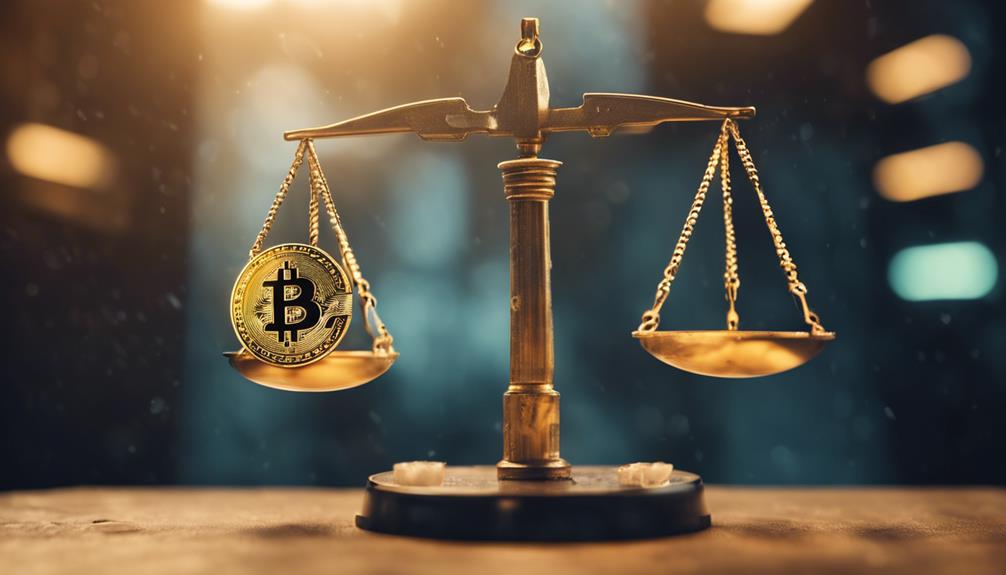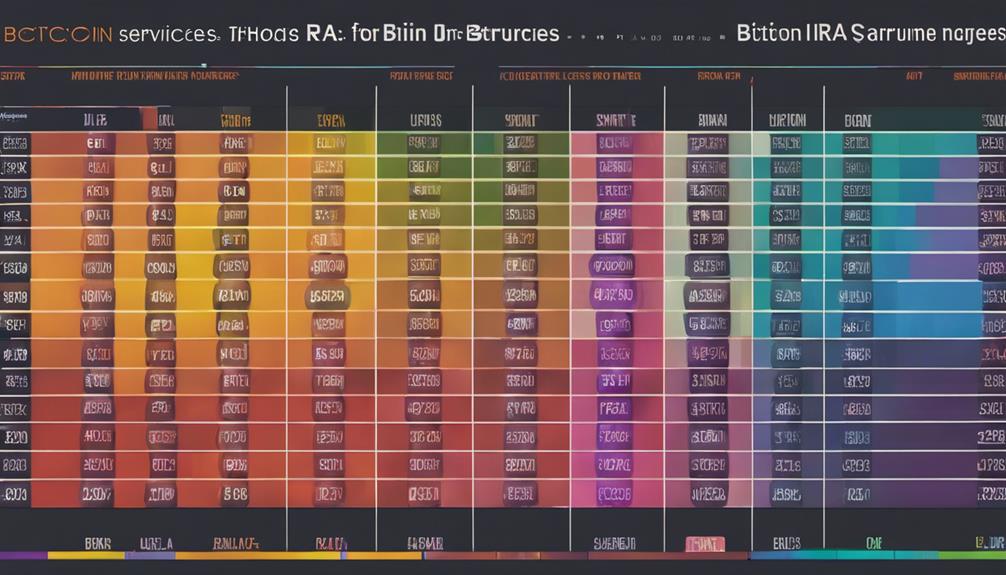In the realm of technology and trends, the combination of Bitcoin and blockchain is revolutionizing innovation and finance. With Bitcoin’s market cap on the rise and big players like Tesla and El Salvador showing support, the future appears promising. Decentralized finance, NFTs, and smart contracts are propelling the evolution of blockchain. Regulations addressing fraud and recent approvals of spot bitcoin ETFs are influencing the cryptocurrency landscape. Businesses are utilizing blockchain for streamlined operations, while AI integration and tokenization are changing industries such as real estate. The worldwide move towards digital assets indicates new possibilities. Explore further about this transformative landscape.
Key Takeaways
- Rising influence of Bitcoin in tech with $1 trillion market cap and major investments.
- DeFi trends include yield farming, NFT integration, and shaping the future of finance.
- Regulatory developments focusing on approval, oversight, and actions against fraud.
- Enterprise blockchain solutions enhancing security, transparency, and efficiency for businesses.
- Global adoption of digital assets signifies a shift towards decentralized finance and tokenization of real-world assets.
Growing Influence of Bitcoin in Tech

Bitcoin's skyrocketing market cap in 2021 marks a significant milestone in its increasing sway within the tech industry. The cryptocurrency's market cap surpassing $1 trillion underscores its growing influence in tech. Tesla's bold move to invest $1.5 billion in Bitcoin not only signaled mainstream acceptance but also highlighted the cryptocurrency's impact on tech companies. Additionally, El Salvador's groundbreaking decision to adopt Bitcoin as legal tender showcased the expanding role of this digital currency in global economies. The increased acceptance of Bitcoin for payments by major players like PayPal and Visa is driving its integration into everyday tech transactions, further solidifying its position in the tech sector.
Bitcoin's pivotal role in shaping the future of digital currencies and decentralized finance (DeFi) is driving innovation and investment in the tech industry. As Bitcoin continues to gain traction, its influence on tech trends, particularly in the domain of decentralized finance, is becoming more pronounced. The tech sector's embrace of Bitcoin is reshaping traditional financial systems and paving the way for a new era of financial inclusion and innovation.
Emerging DeFi Trends in Blockchain

DeFi Yield Farming and NFTs in DeFi are current focal points in the blockchain world. Yield Farming involves users earning rewards by providing liquidity to DeFi protocols, while NFTs in DeFi offer unique digital assets with verifiable ownership on the blockchain.
These trends showcase the innovative and evolving nature of decentralized finance, attracting interest from both retail and institutional players in the blockchain ecosystem.
DeFi Yield Farming
In the rapidly evolving landscape of blockchain technology, yield farming in the DeFi sector has garnered significant attention for its innovative approaches to generating returns through cryptocurrency holdings.
DeFi yield farming involves users locking up cryptocurrencies to earn rewards, often in the form of additional tokens. These protocols offer various strategies like liquidity provision, staking, and farming on different DeFi platforms. To optimize yield, users can move assets between protocols.
However, APY rates in DeFi yield farming can be highly volatile, influenced by market conditions and protocol incentives. Risks include impermanent loss, smart contract vulnerabilities, and potential rug pulls, necessitating careful risk management.
Stay informed to navigate the ever-changing landscape of DeFi yield farming effectively.
NFTs in DeFi
Amidst the dynamic evolution of blockchain technology, the incorporation of NFTs into the DeFi ecosystem is reshaping traditional financial paradigms. NFTs in DeFi go beyond collectibles; they now serve as smart wallets and can execute smart contracts. These unique tokens find applications in identity verification, community memberships, and even collateral for loans. Additionally, NFTs grant governance rights in DAOs, facilitate referral programs, attribute royalties, and validate educational credentials. The inclusion of NFTs in gamification for referral programs, Play-to-Earn games, and bitcoin mining is on the rise. As NFTs continue to expand their utility, they are expected to play an important role in DeFi, providing innovative solutions for various financial needs.
| NFTs in DeFi Applications | Examples |
|---|---|
| Identity verification | KYC processes |
| Community membership | Exclusive access to events |
| Collateral for loans | Borrowing against NFT assets |
Impact of NFT Innovation

With NFT innovation rapidly expanding its reach, the blockchain landscape is experiencing a transformative shift towards utility-driven applications. NFTs are no longer limited to collectibles; they're now acting as smart wallets and executing smart contracts across various applications.
These digital assets are set to revolutionize industries by offering identity verification, community membership, and DeFi solutions. NFTs will provide collateral for loans, access governance rights in DAOs, and enable gamification in referral programs and Play-to-Earn games.
The integration of NFTs into the DeFi space will introduce new dimensions such as royalty attribution, educational credentials, and referral program rewards. This evolution signifies a move towards a more diverse and utility-driven blockchain ecosystem, extending beyond the scope of traditional collectibles.
As NFT innovation continues to unfold, it's clear that these digital assets are reshaping the way we interact with technology and opening up new possibilities for decentralized finance and blockchain applications.
Regulatory Developments in Cryptocurrency

Facing increasing scrutiny and regulatory actions, the cryptocurrency industry is undergoing significant changes in response to governmental oversight. The regulatory progress can be seen through the approval of the sale of spot bitcoin exchange-traded products in January 2024, indicating a growing acceptance of digital assets.
Simultaneously, U.S. lawmakers are actively proposing legislation for cryptocurrency and blockchain regulation, showcasing ongoing efforts to establish regulatory frameworks. These actions are vital as they address the need for regulatory oversight in an industry that has faced issues like fraud and corruption, leading to dampened interest in blockchain technology.
Instances such as the SEC filing charges against figures like Justin Sun and actions taken against companies like Kraken and Nexo highlight the importance of regulatory developments in cryptocurrency.
Future of Enterprise Blockchain Solutions

The future landscape of enterprise blockchain solutions is rapidly evolving as major companies embrace the technology for enhanced security and efficiency. Top companies like Walmart, IBM, Microsoft, and Amazon are leveraging enterprise blockchain solutions to guarantee security, trust, and faster transactions.
Blockchain technology offers transparency benefits across various industries, driving its adoption by enterprises seeking improved processes. Smart contracts within these solutions are essential for providing business advantages such as expense reduction. Businesses are motivated to use blockchain for its secure and trusted transaction capabilities.
The adoption of enterprise blockchain solutions continues to increase due to their ability to streamline processes and enhance data integrity. This trend aligns with the broader context of digital transformation, where companies are integrating blockchain technology to innovate and stay ahead in the ever-evolving business landscape.
The tokenization of real assets and the potential introduction of Bitcoin ETFs further signify the expanding role of blockchain in revolutionizing traditional business operations.
Integration of AI With Blockchain

Integrating AI with blockchain brings a new level of security with features like multi-signature authorization and daily transaction limits. This fusion not only enhances user experience but also boosts scalability for blockchain networks.
Verified AI outputs are becoming increasingly essential to combat emerging threats like account abstraction in the blockchain space.
Ai-Enhanced Blockchain Applications
Leveraging artificial intelligence with blockchain technology enhances security features and simplifies user experience, paving the way for revolutionary advancements in various industries.
Tokenized assets like DePIN demonstrate the potential of AI-enhanced blockchain applications. These solutions are propelling digital asset adoption in Africa, facilitating peer-to-peer payments, micro-financing, identity management, and supply chain tracking.
By integrating AI with blockchain, businesses can implement multi-signature authorization and daily transaction limits, ensuring secure and reliable operations. This fusion not only streamlines processes but also boosts scalability and the veracity of AI outcomes from trusted sources.
The synergy between AI and blockchain technology is set to transform industries, ushering in new business models and secure data sharing practices.
Machine Learning in Blockchain
Enhancing blockchain technology with machine learning capabilities transforms data analysis and prediction within the industry. By integrating AI with blockchain, decision-making processes can be automated, enhancing efficiency substantially. AI algorithms play an essential role in detecting fraudulent activities in blockchain transactions, improving security.
Machine learning models optimize blockchain networks, boosting performance and scalability. The combination of AI and blockchain is poised to revolutionize various industries, enabling smarter, more secure, and automated processes. With machine learning in blockchain, data analysis becomes more precise, and prediction capabilities are enhanced, paving the way for more advanced applications and streamlined operations.
This integration marks a significant advancement towards a more efficient and secure blockchain ecosystem.
Ai-Driven Smart Contracts
By combining artificial intelligence with blockchain technology, Ai-driven smart contracts revolutionize automation and decision-making processes. These smart contracts leverage AI to enable predictive analytics, personalized contract terms, and real-time data-based risk assessment. Industries such as finance, supply chain, and healthcare benefit from the efficiency, error reduction, and streamlined processes AI-powered smart contracts offer.
Adaptability to changing conditions, optimization of resource allocation, and enhanced contract performance are key advantages of integrating AI with smart contracts. This fusion not only creates autonomous and self-executing agreements but also introduces advanced learning capabilities.
The potential for more efficient, secure, and flexible contract management through the integration of artificial intelligence with smart contracts is vast, paving the way for innovative solutions across various sectors.
Evolution of Smart Contracts

Smart contracts have revolutionized the way transactions are conducted by embedding terms directly into code for automated execution. Introduced by Ethereum blockchain, smart contracts enable the creation of decentralized applications (dApps) and tokens. They streamline processes in various industries like finance, real estate, supply chain, and healthcare, automating transactions and removing the need for intermediaries. The security and immutability of smart contracts make them an essential element in blockchain technology. Below is a table illustrating the evolution of smart contracts:
| Evolution of Smart Contracts | ||
|---|---|---|
| Inception | Ethereum Blockchain | Impact |
| 2013: Conceptualized | 2015: Ethereum introduced smart contracts | Enhanced efficiency and reduced costs |
Smart contracts continue to evolve, empowering new possibilities in the digital landscape and reshaping traditional business models.
Tokenization in Real Estate

The evolution of smart contracts has paved the way for significant advancements in blockchain technology, leading to the emergence of tokenization in real estate. Real estate tokenization involves converting ownership rights into digital tokens on a blockchain. This innovative approach enables fractional ownership, allowing investors to own a portion of high-value properties. By leveraging blockchain technology, real estate tokenization guarantees transparency, security, and efficiency in transactions. These digital tokens offer liquidity and accessibility, as they can be traded 24/7, attracting a wider range of investors to the real estate market.
Fractional ownership through real estate tokenization presents new investment opportunities in lucrative real estate markets globally. Investors can diversify their portfolios and participate in high-value properties that were previously inaccessible. The use of digital tokens in real estate not only modernizes the industry but also streamlines processes, making transactions more efficient and secure. This transformation is reshaping the traditional real estate landscape, offering benefits to both investors and the industry as a whole.
Global Adoption of Digital Assets

The surge in global adoption of digital assets signifies a transformative shift towards decentralized finance and blockchain technologies. As more countries and financial services embrace digital assets, the market is rapidly expanding. Real-world assets are being tokenized on the blockchain, offering competitive yield, instant settlement, and transparency. For instance, Black Rock, the world's largest asset manager, launched a tokenized real-world asset fund on the Ethereum blockchain, demonstrating a significant move towards the adoption of blockchain in the financial sector. The conversion of traditional assets like US Dollars into digital assets on the blockchain is broadening the reach of digital asset adoption, making it more accessible to a global audience. This trend highlights the growing importance of blockchain technology in revolutionizing the way we interact with financial assets.
| Global Adoption of Digital Assets | |
|---|---|
| Market Growth | $1.89 billion in 2022 to $3.07 billion in 2023 |
| Countries Embracing | El Salvador adopting Bitcoin as legal tender |
| Real-World Assets | Tokenized on the blockchain for yield and transparency |
Frequently Asked Questions
What Will Be the Future of Blockchain Technology?
In the future, blockchain technology is poised for significant growth and innovation. Expect advancements in decentralized finance, tokenization of real assets, and smart contract applications.
Major companies are already embracing blockchain for enhanced security and faster transactions. Regulatory measures are also strengthening the security of blockchain solutions, fostering global acceptance.
The integration of blockchain with web3, AI, and IoT will continue to drive progress and spur innovation across various industries.
What Is the Trend in Blockchain Technology in 2024?
In 2024, the trend in blockchain technology revolves around expanding utility beyond cryptocurrencies. Businesses are increasingly leveraging blockchain for benefits such as enhanced data privacy and transparency. This shift marks a departure from the previous focus on cryptocurrencies towards embracing the broader potential of blockchain technology.
As we move into 2024, expect to see continued innovation and adoption of blockchain solutions across various industries.
What Is the Next Biggest Thing After Bitcoin?
After Bitcoin, the next big thing in the blockchain world is Ethereum. Its smart contracts and growing ecosystem make it a standout.
DeFi platforms are also gaining traction, offering decentralized financial services. NFTs are making waves by enabling unique digital ownership.
Layer 2 solutions like Polygon and Optimism boost Ethereum's scalability. Web3, the decentralized web, promises new online interactions.
These advancements set the stage for exciting developments post-Bitcoin.
What Is the Next Future for Bitcoin?
In the future, Bitcoin is poised for significant advancements in scalability and efficiency. Increased adoption as a global store of value and medium of exchange is anticipated.
Innovations like the Lightning Network aim to enhance transaction speed and cost-effectiveness. Regulatory changes and growing institutional interest may also influence Bitcoin's trajectory.
Ongoing research and development efforts focus on bolstering security, privacy, and usability for mainstream users.
Conclusion
As you navigate the ever-evolving landscape of bitcoin and blockchain technology, remember that these advancements symbolize the future of digital innovation. Stay informed about emerging trends, regulatory changes, and new possibilities in the tech industry. Embracing these developments requires not only an understanding of their current applications but also an openness to adapt to their transformative potential. By considering expert insights and future predictions for bitcoin, you can better position yourself to leverage these technologies effectively. As the blockchain ecosystem expands, it will likely drive profound shifts in finance, supply chains, and beyond, creating opportunities for those prepared to seize them.
Embrace the potential of decentralized finance, NFTs, AI integration, and tokenization. The global adoption of digital assets is on the rise, paving the way for exciting opportunities and transformative changes in how we interact with technology.
Stay curious, stay informed, and stay ahead of the curve.









